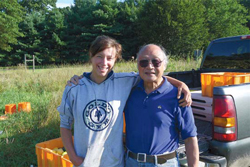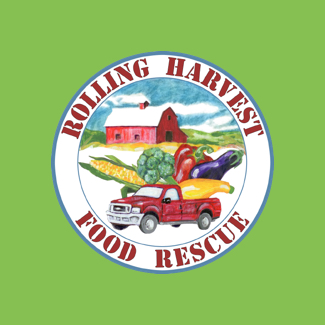An Article Published in the October 2013 issue of Edible Jersey by Helen Chandler
 When I was ordering seeds and scheduling my plantings last winter, it never occurred to me that I might grow more than I could sell. And yet it happened.
When I was ordering seeds and scheduling my plantings last winter, it never occurred to me that I might grow more than I could sell. And yet it happened.
Now, this could mean that I am not offering what people want. It could also mean that I need to develop my customer base. I tend to believe that I have just what people want—who doesn’t want crunchy peas, flavorful spinach, tender kale and aromatic herbs?
But I do have to develop my customer base. As with any beginning business, people have to get to know me. I have to be consistently in the same place, at the same time, offering the same great stuff, before people will begin to count on me. This takes time.
One of the more satisfying implications of my problem of plenty is that, although I haven’t gotten all the marketing stuff straightened out just yet, at least I am able to successfully grow vegetables. As silly as it sounds, that part has been a relief.
But there were so many vegetables left in the field, all beautiful, all delicious, with nowhere to go. This was bad both because of the waste and because many crops require regular harvesting in order to continue producing. If left to their own devices, they will happily produce seeds and move on with their lives. I never imagined the intense pressure I would feel from those vegetables as I looked out at them in their then-neat rows. I thought all the farming pressure would be internal, stemming from my expectations of myself and others and from grappling with reality. I could even imagine pressure from customers and peers, but from the food? I didn’t see it coming.
The plants were maturing and I didn’t have a place for them to go. I remembered that several farms in the area work with a group called Rolling Harvest Food Rescue, an organization that collects produce from local farms and distributes it to hunger-relief agencies throughout the greater New Hope-Lambertville area. I had hoped to work with them in the future but did not think I would have enough extra to do so in my first year. But after a particularly rainy market day, I could take no more. I called them to see if they would pick up my excess bounty. It was surprisingly easy. Even though I am slightly out of their range, out came Rolling Harvest founder Cathy Snyder and two of her children, along with John Hwang. John sometimes works with Rolling Harvest, but regularly works independently toward the same end: collecting overabundance and delivering it to people who want it. The visitors oohed and ahhed over my produce as we packed it into boxes.
Since that first visit, John has continued to pick up whatever extra produce I have to spare. What a pleasure it has been to work with him! He is always joking and lifting my spirits. When we first met he introduced himself as John Radish, and then, grinning, the lone ranger Johnny Walker. He is 81 and as spry as a 20-year-old. He said they call him a silly old man, and I can only imagine it is because of his enthusiasm and energy. Not only does he pick up my already harvested, aftermarket produce, he comes out and harvests my excess straight from the field, a practice called gleaning. He picks the produce that I would not be able to sell, either because there is just too much of it (oops) or because it is no longer beautiful even though it is still delicious and healthy. And he does all this while beaming and chatting and laughing. Once, while he was pulling radishes, I heard him exclaim “I hit the jackpot!” and looked over to see him beaming, holding one of the biggest, ugliest, but probably tastiest radishes I had ever seen.
John delivers all the food he gets from me to local food pantries and senior citizen centers, along with information about each of the types of vegetables. He always thanks me and says how much it means to him that we are doing this, and all I can do is thank him right back. He is helping me achieve one of my business goals that I did not expect to reach so fully in my fi rst year—offering healthy, delicious food to people who do not have access to it otherwise. Without John, I would not have time to harvest the excess or to take it to where it is needed. As much as I am offering something to him, more so he is offering something to me. So thank you, John. I look forward to a year of feeding people with you.



